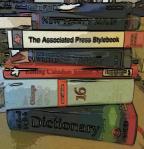 I have to admit that I had never given this one any consideration until it came up in something I was working on yesterday, and I had to look it up to check. So: zeros or zero?
I have to admit that I had never given this one any consideration until it came up in something I was working on yesterday, and I had to look it up to check. So: zeros or zero?
Zeros is a plural noun, and oddly enough it’s the plural of zero. No e when you have lots of zeros.
Zeroes is a form of the verb to zero (in), meaning either to set a measuring device back to zero (I have never heard or read this myself, but M confirms that he uses it with measurement devices in his scientific job!), or to home in on something: “She zeroed in on the fact that he had hidden the muddy boots in the shed”.
So the noun has no e – “there are too many zeros in this post” and the verb does have an e – “my reader zeroes in on the fact that I had to look it up and contacts me to ask me why I don’t know everything off the top of my head”.
You can find more troublesome pairs here and the index to them all so far is here.
Lindsay McLoughlin
January 11, 2013 at 9:23 pm
Great post! Interesting, also, that we can have one hero but lots of heroes!
LikeLike
Liz at Libro
January 12, 2013 at 9:16 am
Thank you – and yes, indeed – that’s why I had to look it up, because I thought it was zeros and then doubted myself!
LikeLike
Juli Hol
January 19, 2014 at 4:26 am
Thank you for explaining it 🙂
LikeLike
Liz at Libro
January 20, 2014 at 9:58 am
You’re welcome – glad I could help make sense of this one!
LikeLike
Meaghan ReBell
April 1, 2014 at 12:25 am
thank you!!!! i saw this “rule” a few years back, and just saw your post on it now…coincidentally, Merriam-Webster says there is no difference…i have boycotted MW ever since they added funner to the dictionary…the least they could have done was to put a disclaimer with it…something along the lines of: slang, not grammatically correct
anyway, thank you
LikeLike
Liz at Libro
April 1, 2014 at 8:07 am
I can’t really comment about why or if they’re the same in American English, but it would be a shame to lose the distinction between them, I think.
Best wishes,
Liz
LikeLike
D
March 28, 2020 at 3:32 pm
I am still confused. In the third paragraph, you are explaining “zeroes” but you use “zeroed” in the example. I have heard of zeroed used – zeroed in on or zeroed out. The latter is commonly used in finance and accounting to indicated that the balance of an account has been brought to naught. However, there the “e” must be present as part of the modifier changing the term to past tense, “ed”. This is the same as the verb form of a word like “count”; the past tense takes on the -ed. Notwithstanding, when the verb form of count is plural it is not “countes” but “counts”. I am having a tough time thinking of an example of multiple zero as a verb. The only one I can think of is when describing a process somewhat informally, such “then a good detective zeroes in on inconsistencies in the subject’s alibi”. I cannot think of any examples of plural past tense of the verb zero – one in which the “e” being present in zeroes would be explained by the addition of the -ed for past tense. So, the e must be present because zero ends in a vowel, right (I am guessing at this)? But, isn’t it the same for the noun then? Shouldn’t they both end in -es?
Also, in one of the comments, zero is likened to “hero”. But, while the plural noun form of hero is heroes, not heros. In your second paragraph, you state that the plural of the verb form does NOT have the e. I can’t think of hero having a verb form unless you are making pseudo-slang, as when a post-millennial changes “adult” to a verb: I am not up for adulting today.
I am certainty not saying your conclusion is incorrect, just showing where I am confused.
LikeLike
Liz Dexter
March 28, 2020 at 4:21 pm
In my reply to the comment about heroes I make it clear that it’s not the same, although I don’t know why. The multiple of the noun has an s, the verb form when it has an s also has an e. There isn’t a reason and it appears to be an exception to the rule that you’re looking for, I’m afraid.
LikeLike